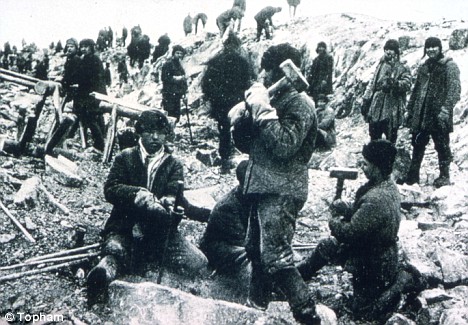That isn't how the Fascist system worked.
If we're now talking specifically about Fascist Italy, then it is inaccurate to generalize the entire timespan of Italian economic planning in one convenient sentence. The fascist system in Italy worked differently at different times. Historians pretty much agree that Mussolini did not have an economic plan, and literally used the Italian economy as a social experiment.
Most industrialists willingly participated in fascist economics because they personally gained immense wealth (at the war went badly). The government gave them profitable monopolies in return for going along with then national agenda. In Italy, Mussolini was striped of power when his war made the arrangement no longer profitable.
You make it sound like the businesses had control over Mussolini and not the other way around.
Hitler also allowed considerable autonomy until the war became desperate in '44.
I think that's a despicable statement that doesn't consider any of the hard facts. To consider that Nazi Germany allowed any autonomy- at all, is ridiculous. The Italian and German governments controlled so much of the aspects of business at various points of their career that it would almost be offensive to consider it a "mixed economy." If the government decides who you may hire, what you may produce and when, how you may operate, and not to mention obliterating unions and any form of bargaining, how is that mixed? How is that autonomous? It may be true that Italy did not fully nationalize its industries and the businessman actually retained his profits. But that's a far cry from claiming that Hitler and Mussolini allowed quite a bit of economic freedom.
The USSR was not corporatist. The best descriptor would be a planned economy, as economic output was determined by a central committee giving orders to state owned factories.
There is no single definition of corporatism. There are only interpretations of the concept. The base root of corporatism is corpus- body and such meaning can have multiple applications. I, however, take the interpretation of Herman Goering when he infamously stated that fascism should rightly be called corporatism, because "it is the merger of state and corporatist power." I tend to view socialist, fascist, and hardcore Keynesian economies as corporatist. In terms of our comparison, the difference is extremely subtle. Whether the government outright nationalizes the industry or subtly takes it over and controls it (but allows the owners to retain a portion of the capital), it is of little relevance when examining the large picture. Both governments sought to merge the power of state and corporatist bodies. Russia, under Lenin's NEP, was a form of state capitalism, though I realize it did not last long.
I don't understand how anyone could claim that fascist Italy or Nazi Germany were mixed economies. If they were, it was 95% socialist and 5% capitalist. You know how some pundits and critics will claim that Western European countries are "socialist" (even though the Europeans themselves will identify as social democrats)? Well, Nazi Germany and Fascist Italy were the largest "socialist" states ever to appear in that region.



